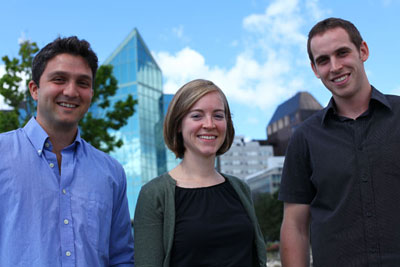 |
| James Kesten, Marie MacCormick and Tyler de Gier are engineers employed by Welaptega Marine. (Bruce Bottomley Photo) |
What is the most stressful situation you could imagine?
Try this one on for size: the Macondo well has blown out, killing 11 workers and spewing thousands of barrels of oil into the Gulf of Mexico. Birds, marine mammals and fish are dying. Oil is heading towards sensitive coastline.
Plans A, B and C haven’t worked and BP, the London-based petroleum company, is running out of alphabet. Time to bring in the Canadians.
Three young engineers with Welaptega Marine in Halifax returned home in mid-July after assisting BP in its efforts to repair the ruptured Macondo well.
James Kesten (BEng’08) and Tyler de Gier (BEng’08), who studied mechanical engineering at HÂţ», spent several weeks at the spill site leading up to the successful capping of the well on July 15. A third Welaptega mechanical engineer, 3-D modelling expert Marie MacCormick (BEng’07) worked out of BP’s Houston, Texas office for the duration. She’s also a Dal grad.
“BP is already a client of ours, so for me, it was a matter of reminding them that we were here as a resource,” says Tony Hall, owner of Welaptega Marine, a subsea engineering support firm specializing in marine imaging technologies for the offshore petroleum industry. “I can’t say enough about my people. Here they are in their mid-20s parachuted into an extremely high pressure situation to help solve one of the biggest offshore incidents in history.
“The quality of the people we get from HÂţ» is phenomenal.”
Without going into too much detail – Welaptega is not authorized to divulge the exact nature of the work – the job was to create a 3D model of the blown well, passing on the data to BP in its quest to plug the gushing wellhead. Based on a ship, Mr. Kesten and Mr. de Gier used a minivan-sized remotely operated vehicle sent down from the ship to get the photographs needed, while on shore, Ms. MacCormick, created the accurate 3D models.
“When I first heard what happened, I was thinking that what we do could definitely help,” says Mr. Kesten, 25, who first came to work at Welaptega on a co-op placement and was hired on after graduation in 2008. “When we finally did get the call, we were choppering into the site less than 12 hours later. It looked like a war zone.”
“It was high pressure, definitely,” adds Mr. de Gier, 25. “But at the same time, it was all about safety and doing it right.”
